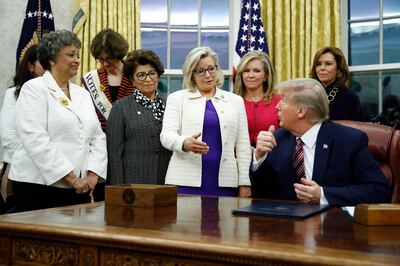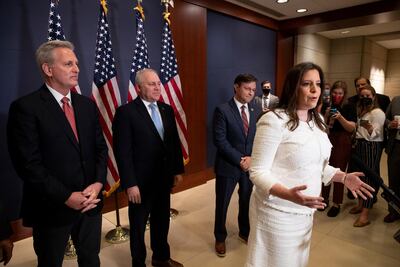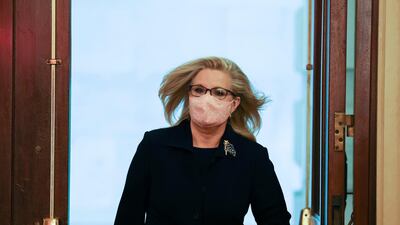Last week in the US, Representative Liz Cheney plainly intended to make history by going all-in, hazarding her entire career by wagering against former US president Donald Trump. For several days, she was shadowed by acclaimed photographer David Hume Kennerly who memorialised each intended momentous development for posterity.
Mr Kennerly, who has photographed every US president since Lyndon Johnson and is chief official White House photographer, may not have been at the closed-door May 12 meeting, at which House Republicans ousted her as their third ranking leader, but his general presence was an unmistakable, dramatic statement.
In contrast to her steely bravado, her pusillanimous colleagues met for just 15 minutes, and dumped her through an indiscriminate voice vote, although some disparaged and even childishly mocked her.
Her sin is her harsh criticism of Mr Trump. Worse, she indignantly denies his now-defining lie that he was robbed of victory last November through massive fraud, which clearly did not happen. Most gallingly, she refuses to keep quiet.
This last point is the most critical.
Few Republicans in the House doubt the 2020 election was fair, clean and remarkably successful, despite a pandemic and deep political divisions, with the largest turnout in over a century. Even fewer, however, are willing to frankly acknowledge that simple and crucial fact. Many claim fraud or express grave doubts. Others note that most Republican voters believe there was fraud and that is all that matters.
But Republican voters have only swallowed this fairy tale because so many Republican leaders have either deliberately misled them or at least failed to bluntly correct the record, thereby creating a self-reinforcing feedback loop of toxic disinformation. That is precisely what Ms Cheney has been systematically countering.

She correctly insists these falsehoods pose a grave and imminent threat to US democracy. If the entire process is indeed a sham, the US government in that case would deserve no respect whatsoever. The most bitter US enemies around the world could not put it better. It is a supremely unpatriotic position, particularly because it is absolutely untrue, and its proponents know that but are motivated by entirely cynical reasons.
Ms Cheney angered other Republicans by defending the system, declaring Mr Trump unfit for office, and insisting: “I will do everything I can to ensure that the former president never again gets anywhere near the Oval Office."
Many of her colleagues would privately sympathise. But, because their party is now almost exclusively defined by Mr Trump, with rare exceptions they fervently defend him at all costs. Hardline Trump loyalists go even further, aggressively propagating a whitewashed fictional narrative about the deadly January 6 attack against Congress by a violent pro-Trump mob.
Like Mr Trump, they paint the insurrection as a "normal tourist visit" by orderly, law-abiding patriots who showed respect and affection for the police (who, in fact, they attacked and, in one case, killed).
Several insist that any violence was actually committed by leftist infiltrators or that the chaos was somehow the fault of House Democratic leaders. Others blame police for "executing" a violent protester who was shot while rampaging through Congress or for "harassing peaceful patriots" by investigating lawbreaking committed at the riot.
This is all intimately connected to the campaign to discredit the election and press the risible falsehood that Mr Trump was the real winner.
Ms Cheney's unceremonious ejection is the ultimate confirmation that her party has degenerated into a highly organised personality cult despite Mr Trump's decisive election defeat. She is among the most stalwart and stridently conservative Republicans in Congress. To reverse a cliche from the classic film The Godfather: "It's not business, this is strictly personal." But her long-term challenge to Mr Trump is potentially threatening precisely because she is far more conservative than he is, or ever was.
She is certainly more conservative than her successor, Elise Stefanik, a political moderate but ardent devotee of Mr Trump.

Ms Cheney's message boils down to: "It's him or me". Obviously right now it is him, but her speculation is that eventually, his mystique will evaporate. It could be due to legal charges or scandalous revelations, a strong midterm for Democrats next year, or a health crisis, among other possibilities.
So, she has dramatically positioned herself not as Mr Trump's successor, nor as a potential unifying figure between his base and traditional conservatives, but as his stark antithesis.
If Republicans soon seek an anti-Trump corrective to decisively turn away from his brand of politics and legacy, she has laid the only really credible claim to that mantle thus far.
In the event of a "this party isn't big enough for both of us" confrontation, it would be impossible for Mr Trump or his surrogates to successfully attack her as insufficiently conservative. She is very far to the right, but in the Reaganite, not the nativist or white nationalist, tradition.
She could be attacked from her left as too conservative, but instead the Trump camp will surely paint her as an internationalist warmonger, anti-populist elitist from a family of party bigshots, and servant of globalist capitalism against the American working class.
That is all, of course, just code for not being personally loyal to Mr Trump. Ms Cheney has positioned herself as the champion of a purifying return to traditional, but very right wing, conservatism in case – as she hopes and may well expect – Republicans decide to turn away from Mr Trump in the foreseeable future. At the moment, though, it is definitely no contest. His grip on the party is rock-solid.
Even if she is right about long-term trends, timing might be the biggest weakness in her wager. If Mr Trump's star does fade before the next presidential election, Ms Cheney faces the immediate and extreme danger of losing her House seat in Wyoming next year to a pro-Trump candidate.
All of Mr Kennerly’s masterful photos may not resurrect her career when and if a post-Trump Republican alternative is needed, should she spectacularly crash and burn before his spell has broken. For all its boldness, her gambit is a massive longshot.
Hussein Ibish is a senior resident scholar at the Arab Gulf States Institute and a US affairs columnist for The National


